- Home
- Jason McIntyre
Dread
Dread Read online
Dread
a novella by
Jason McIntyre
Published by &
Copyright © 2015 Jason McIntyre
All rights reserved. Without limiting the rights under copyright reserved above, no part of this publication may be reproduced, stored in or introduced into a retrieval system, or transmitted, in any form, or by any means (electronic, mechanical, photocopying, recording, or otherwise) without the prior written permission of both the copyright owner and the above publisher of this book. Thank you for respecting the work of this author.
This work contains MATURE CONTENT
Fiction titles by Jason McIntyre
On The Gathering Storm
Thalo Blue
Walkout
Mercy and the Cat
Black Light of Day: A Collection
Nights Gone By: A Collection
The Night Walk Men: A Novella
The Devil’s Right Hand: A Night Walk Men Novel
Corinthian: A Night Walk Men Story
Kro: A Night Walk Men Story
Dovetail Cove titles by Jason McIntyre
1. Deathbed (Dovetail Cove, 1971)
2. Bled (Dovetail Cove, 1972)
3. Fled (Dovetail Cove, 1973)
4. Redhead (Dovetail Cove, 1974)
5. Zed (Dovetail Cove, 1975)
6. Unwed (Dovetail Cove, 1976)
7. Shed (Dovetail Cove, 1977)
8. Dread (Dovetail Cove, 1978)
9. Instead (Dovetail Cove, 1979)
- 10. [COMING SOON] (Dovetail Cove, 1980) -
Learn more about the author and his work at:
www.theFarthestReaches.com
Dovetail Cove
Monday, October 16, 1978
Part I
The Wake
Do not stand at my grave and weep,
I am not there...I do not sleep.
I am the thousand winds that blow...
I am the diamond glints on snow...
I am the sunlight on ripened grain...
I am the gentle autumn rain.
When you waken in the morning’s hush,
I am the swift uplifting rush
Of gentle birds in circling flight...
I am the soft star that shines at night.
Do not stand at my grave and cry—
I am not there...I did not die...
—Traditional Irish Elegy
1.
My brother and me, we carried a wooden box through the rain while Mrs. Troyer watched with disdain from under the tattered red awning of the Kresge. Bearing the pall, they call it. When you heave a coffin off to be buried in the mud, that’s what they call it: the pall. A gloom. A burden to struggle under, a heft to strain beneath while shoulders sag.
Of course, we didn’t struggle alone. Four other men hoisted this box with us, four others bearing that encumbrance alongside my brother Mac and me out on Main Street. Though they surely didn’t haul the same balance of weight we did. Couldn’t have. Ol’ Doc Sawbones had a heart condition so he didn’t bear. Delia and Cordell Smythe didn’t bear either. Their stretch at a federal prison on the mainland wasn’t over yet. And, oh boy, wouldn’t that have been a hoot if they’d shown their faces around here again? Everyone else who either knew her or sat next to her in church or rode with her on the cripple bus downtown was either gone...or dead themselves.
So we had Danny Hellegarde, a gruff old son of a bitch from the drop-in centre. We barely knew him and he barely said a word. I worried he’d drop dead himself, and just at the prospect of taking the casket a half block down Main—but he proved himself sturdy when it came time to lift. We had Mr. Parson, the owner of the hardware store, Rod Davies, the postman, and Zeke, the town retard. Mac and me, we hadn’t called him that since we were kids. He was older than us by at least twenty years but he’d always looked old, always been pudgy with almost no hair. The few translucent white wisps he did have arced eighteen inches over his shiny head after starting above both ears.
Today, though, Zeke’s scant hair lay down the sides of his neck, wet with the pouring rain, like his grey coat and the rest of us in our blacks of the dead. We six, my brother and me at the head of the casket, all walked in deafening silence under the white noise of the rain, accented only by quiet grunts from the older men when we had to step down off the curb.
The rain had flooded out the east end of Main Street. Just shy of a week’s rain had the sewer basins backed up. Cobb’s Funeral Home stood at the low end of Main and the corner of Seventh, which went north-south, likely four feet closer to sea level than the high end. Mr. Cobb had stalled out his engine in standing water, which went up past the wheels on his only hearse. A town this size on an island this size, well, we didn’t need more than one carriage of this sort.
He’d gotten it towed to a higher portion of Main and boosted. It sat idling and Mr. Cobb opened the hatch with a rusty squawk. Mr. Parson’s knees popped behind me and he inhaled breath through his teeth with a whistle of effort as we all lowered ourselves and eased the casket down onto the outstretched rollers. Mr. Cobb pushed it forward from the back end and it tracked its way inside the darkened cave of the hearse, canted to the driver’s side. We backed away.
He closed the door, latched it with a clunk and moved off with no eye contact for either my brother or me. The other men stood back up on the sidewalk. Mrs. Troyer had moved along.
Did my brother and I think it odd that no one came for the service, except for the four men we’d asked to ‘bear the pall’ of it? Their wives came too, of course, those that had wives. And Zeke came with his elderly father. Did we think it odd that the men of the cloth at all of Dovetail Cove’s traditional churches had refused to hold funerary services? Did we think it odd that even the Pentecostal Church of Zion denied service under their holy roof?
No. None of that struck us odd.
But being back on the island after an increasing stretch of months and months away only made the mood of everything else painfully obvious. The sea was our home now, my brother and me—how many years away had it been? How many with just our rough and tumble fellow fishers and lobster men? I’d lost count. And now, back on land, I felt a gaping hole. We’d seen and done it all in our time away: the women, the swearing and dirty talk, the card games and the fights...the drink. We’d be back to that soon enough. But here, this other thing couldn’t be ignored. This...mood, it hung like heavy sentiment beyond the obvious pall of a funeral. The weight of it here now—had we not noticed it as teenagers before heading out to the blue yonder? Or could it be new? Wearing such a weighty coat burdened more than the casket, even without a division of six ways. We would talk of this weight later, me and Mac. In our stifled, truncated way of discourse, we would discuss it. Somehow, we would have to.
My brother Mac combed fingers back through his soaked hair and gave me a look as the driver’s door on the hearse slammed. Cobb plunked the car into gear. It gave a shudder and the tailpipe coughed. He drove away and sprayed our new black shoes. They had already soaked through anyway.
Mac stepped off from me. We’d have to walk back to get his truck, still parked in the lot at the funeral home.
In the distance, under her gold umbrella, Mrs. Troyer moved east on the sidewalk. The hearse passed her, sending a spray of rainwater but missing her as she widened her gait from where the waves pattered the concrete near her feet. The grey and flooded backdrop of Main Street stood pale behind Mrs. Troyer, who hurried along without taking further notice. She still had her back to us, this group of black-draped men, doused and dour-faced, with our heads hung. Her short legs hustled—to either get somewhere, or, more likely, to get away from something. She didn’t look back, not once.
Like most in town, she had no need of saying goodbye to the woman in the
casket.
We wouldn’t have either, Mac and me.
But we had to, didn’t we? We were her only sons.
2.
Ma’s plot lay at the bottom of the hill, close to the road and as far away from Da’s as she could get, apparently through a trade about four years ago. Da’s hid further north across the creek that wound through the old cemetery. Mr. Cobb had us carry the casket from the back of his idling hearse up through the soggy grass and set it down on a set of straps across a hand-dug hole. Old Danny Hellegarde looked worn out and miserable in the downpour but he didn’t complain. None of the men did. They were probably counting the minutes until a hot bath and a few fingers of brandy by a fireplace.
On account of the perpetual rain, we lowered Ma in without further ceremony. A nod between Mac and me indicated flat satisfaction. Neither of us needed to say anything. And Mr. Cobb certainly didn’t want to add anything further than his glossy words at the funeral home. He likely hoped his engine wouldn’t quit again on the way back.
Seven sets of men’s shoes squelched in the grass on the walk back to the road. On the walk with Mac back to his truck, the rain switched off—almost like God had grown weary of hand-wringing the clouds over Ma’s head the bulk of her life. Once we threw handfuls of mud on Ma in her space below ground maybe those dark clouds had finally been wrung dry.
Back at the house, more folks showed up than we expected. We didn’t mean to pick the Monday directly between Game 5 and Game 6 of the World Series, but we did, and that might have accounted for the extra traffic treading up Ma’s brown front yard from the broken asphalt of Lannen Lane. More than twenty poured through Ma’s front door, shaking their wet things into the living room carpet. Mac raised an eyebrow at me. But as was his style, he didn’t say anything. Not yet. He’d talk later, after the meat and cheese platters held only crumbs.
Likely it would be a dry comment about how Ma wasn’t worth their time to visit or help all the years she sat alone in this house watching TV, wasn’t worth their time to sit through a service awkwardly conducted by the town’s funeral director who had only read a half-dozen eulogies in his career. But when it came time to eat food in her living room as paid for by her meagre estate, they’d make the time and come in out of the rain.
And in his dry way, Mac would be right. Mac was nearly always right.
The wives and Zeke’s elderly father shook our hands with faint grip and said things like, “our condolences” and “so sorry for your loss,” but mostly Mac and I stood quietly and let the others eat and drink and mingle. Their hushed voices filled Ma’s house with a steady warble.
Parson and his wife sat in silence, though they spoke when others engaged them. Mac and I had been off-island for six years and knew none of the town’s gossip. My little sister used to keep us up, but since she’d left home, we got sparse letters from her. The story we’d heard said Mr. Parson had inherited his uncle’s house north of the creek after more than a year of haggling over the estate and searching for heirs. Another year of dissent about what to do with the property followed—and that had led to marital tensions.
“Fixin’ to sell, Walt?” someone asked Mr. Parson. “Oh, I expect so,” said Parson, his wife eyeing him sideways from a spot on my Ma’s sofa. Parson reached for a piece of cheese, maybe angling for a new subject. “We'll be watching the Yanks tomorrow af’noon. Then we’ll sit down with an agent this week, see what kind of value they’d put on it.” Maybe not.
Parson looked toward Mac and me, sharing the doorway to the kitchen but keeping mum. “I have it on good authority there’ll be another of them acreages north of the crik up for sale this fall. Investor bought it ‘round the first o' the year, fixed it up real nice. He’s looking to make a little profit, a' course, but prices are still like stealin’. That stretch’d be a good place to raise a family.”
Neither Mac or myself had married yet. Both of us had celebrated thirty-some birthdays and, truth be told, I hadn’t given the idea much thought. Look how Ma’s family had ended up.
Danny Hellegarde still looked winded. He had himself pulled up under Ma’s dining table but he downed his food and beer like he needed to get going. He paused then, and cast his eyes over at us boys in the doorway with Parson’s comment about raising a family hanging in the air. Danny lived up that way too. The south portion of his father’s land had been subdivided a few years back to make way for the parcels. I think only six had ever been built on. His big piece of that pie lay farther north along the Old Rail Line to the edge of the shipyards. A wasteland fell between Hellegarde’s north divide and King’s Corner that proved, at best description, unsuitable for farmland. Just scrub bush and some trees that looked as old as the island but still eked out survival.
Mac didn’t say anything. Neither did I. And, in a moment, the burble of conversations gained volume again. Mac moved out of the way for Doc Sawbones to push past us and through the kitchen door. The big man’s face blared red. “Drinkawater,” he said with a stifled choke. Must have gotten something down the wrong pipe, I thought, but Mac went in with the old doctor and the swinging door drew shut, inadvertently banging into me and easing me farther into the room.
“What about all them stolen goods down on Main?” Mrs. Walsh asked the room. “Any of you men know who’s up to that?” No one said a word. Harlow, the grocery store owner, wasn’t here. No other business owners had darkened Ma’s door today and Mr. Cobb hadn’t, to my knowledge at least, had anything stolen. You don’t hear of many coffins or urns getting lifted.
Zeke’s old Da spoke up. “I heard you snagged a couple boys lookin’ to lift from yer hardware store, Walt.”
Parson gulped a bit of biscuit and said, “Naw. Harmless boys. And that was a while back now, anyhow. Way back—oh lemme see now...musta been the last time the Yankees took the Dodgers to school—” He winked in Roddy’s direction. “But those boys weren’t up to no good. Just up to the dickens is all. They’re good boys, ain’t they, Mrs. Walsh?”
Mrs. Walsh nodded her silent agreement, then broke eye contact with Walt Parson. Mr. Parson looked directly at Zeke’s father, though he, like most in town, couldn’t remember the old man’s name. “It actually sounds like Vern got the worst of it. A couple TVs and one of them new hi-fi stereo units. It wasn’t them boys who did it, I assure you but...all’s I’m missing is a pile of them insulated extension cords.” He laughed then, which sounded odd in the low burble of Ma’s living room, a place that likely hadn’t seen this many visitors since our Da had passed. “Me and Vern, we joked the thief must be stealing power for his new home entertainment centre.”
A few laughs at this, but mostly the uncomfortable kind as folks observed the etiquette of a wake. Besides that, the deceased’s silent middle child stood watch by the kitchen door.
Rod, the postman, joined the stifled laughter anyway and said, “You sure they weren’t looking for that bottle you got stashed behind your counter, Walt?” He looked around at the other mourners as if to get some inertia for his joke. “Come on, Walt. Maybe they need those cords to power a fridge and keep the beer cold. You got any beer back there with the Black Label?”
The laughter rose. It came at Parson’s expense now. He grew grave and delivered a moment of silence. “I quit clean last winter, Roddy,” Walt Parson said, and the laughter dried up in a second. “You know I did. Whole town does. After my Uncle Sammy and that whole mess, the neck on that Black hasn’t been scored. I keep it as a reminder.” Mr. Parson looked around the room, flashing eye contact with his friends and neighbours, most in the only black clothes they owned. “I’ve seen some things the last while that’d bring any man to sobriety, dead cold, just like me—”
A bang and a clatter from the kitchen behind me jarred us all. Everyone turned to look in my direction. Startled, I turned tail and headed in, letting the door close behind me. At my feet, a shattered drinking glass and a pool of water twinkled on the floor tile. I looked up from that to see Ol’ Doc Sawbones, just as red-faced
as before. His round ass and back pressed against Ma’s pantry door. It shimmied behind him, trying to open but Doc’s sizeable rump held it—for the moment. At first, I thought he had collapsed against the closed door; maybe his choking spell had gotten worse. But off to my side, Mac held Ma’s broom like a weapon. His upturned dress shirt sleeves showed veins and tanned forearms flexed like when he hoisted lobster pots. He had his broom aimed at the Doc. Or, more likely, at whatever pushed against Doc and the pantry door, banging to be let out. Mac’s profile showed a look of surprise and not menace. Surely, Ol Doc hadn’t tried to steal some of the good china.
“Back away now, Davie,” Doc said with a grunt of effort. The pantry door behind him had frosted glass panels and one blew out over his shoulder, making the old man cringe. That’s when I could see the darkness of a figure back inside the pantry. The door shook and pushed outward. Doc grunted, his legs angled like posts against his hips and ass, planted on the floor to leverage his imposing heft and keep the door from pushing open. He managed to plunge the door closed again, this time with a bang that shook the frame of the house. Doc posed a formidable man. But the force matched him in presence. It made sense to me now. Mac hoisted the broom in a stance of self-preservation against whatever stood behind Doc. Not Doc himself.
Doc poured off sweat. He grunted. His black shoes slipped on the white floor tile. He made eye contact with me, relaying a sheer panic I’d never seen on him. I must have only met him with a gaze of confusion.
The sliver of darkness in the empty pane over Doc’s meaty shoulder grew and turned blurry. Then there winked a bit of a face, one cheekbone and some forehead. Puffy yellow skin, then one black eye darting around like a bird tilting its head this way and that. No white in that eye, just glossy black, like a drop of oil. Then the face moved away from the opening. Silence then, only the heavy breathing of Doc, who had to be in his seventies at least. But the silence ended. Then, whoever the pantry door held, wound up and blasted his way through it. The panels blew apart like a set of charges detonating. Doc launched forward as if he’d been a scrawny fifty pounds, not topping two hundred fifty. His bulky mass nearly collided with Mac’s outstretched broom. I cringed back, instinctively slamming my eyelids shut and recoiling against the closed door of the kitchen behind me.

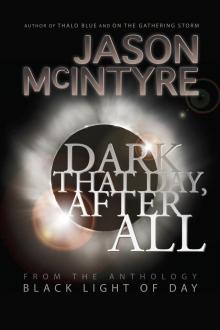 Dark That Day, After All
Dark That Day, After All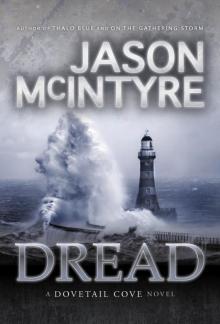 Dread
Dread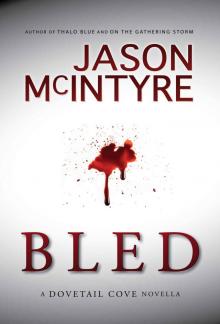 Bled
Bled Instead
Instead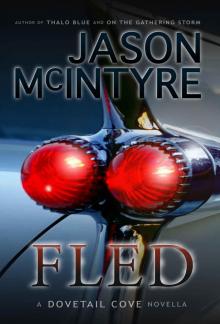 Fled
Fled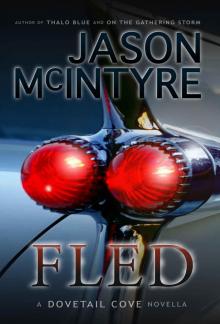 Fled (Dovetail Cove, 1973) (Dovetail Cove Series)
Fled (Dovetail Cove, 1973) (Dovetail Cove Series)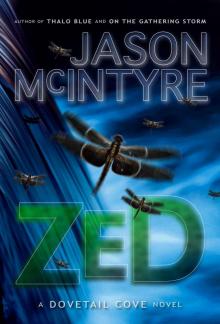 Zed
Zed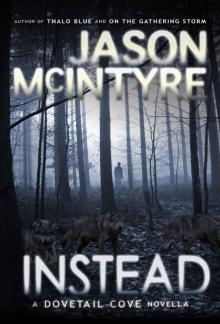 Instead (Dovetail Cove, 1979) (Dovetail Cove Series)
Instead (Dovetail Cove, 1979) (Dovetail Cove Series)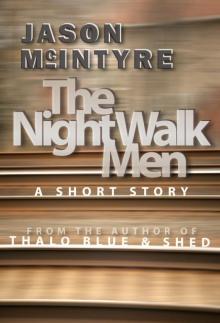 The Night Walk Men
The Night Walk Men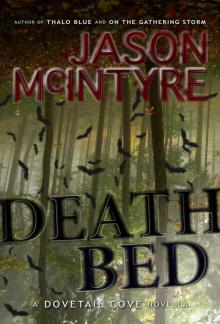 Deathbed (Dovetail Cove, 1971) (Dovetail Cove Series)
Deathbed (Dovetail Cove, 1971) (Dovetail Cove Series)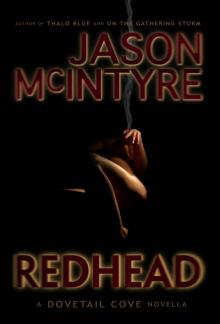 Redhead (Dovetail Cove, 1974) (Dovetail Cove Series)
Redhead (Dovetail Cove, 1974) (Dovetail Cove Series)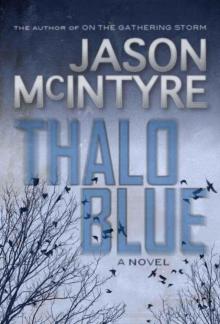 Thalo Blue
Thalo Blue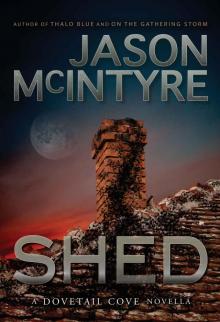 Shed
Shed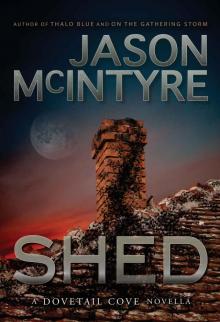 Shed (Dovetail Cove, 1977) (Dovetail Cove Series)
Shed (Dovetail Cove, 1977) (Dovetail Cove Series)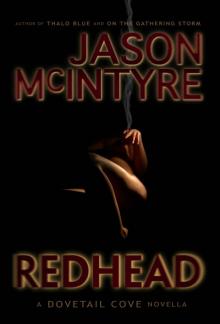 Redhead
Redhead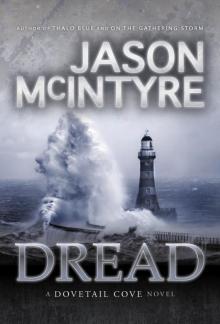 Dread (Dovetail Cove, 1978) (Dovetail Cove Series)
Dread (Dovetail Cove, 1978) (Dovetail Cove Series)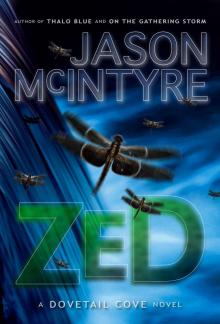 Zed (Dovetail Cove, 1975) (Dovetail Cove Series)
Zed (Dovetail Cove, 1975) (Dovetail Cove Series)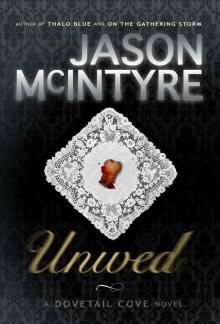 Unwed (Dovetail Cove, 1976) (Dovetail Cove Series)
Unwed (Dovetail Cove, 1976) (Dovetail Cove Series)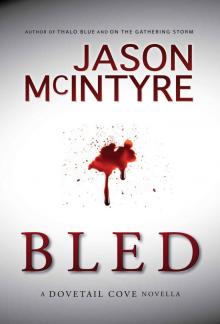 Bled (Dovetail Cove, 1972) (Dovetail Cove Series)
Bled (Dovetail Cove, 1972) (Dovetail Cove Series)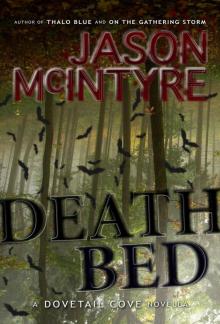 Deathbed
Deathbed